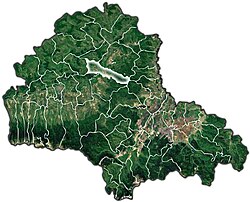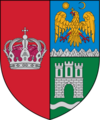Comăna
Comăna | |
|---|---|
Commune | |
 Location of Comăna, Braşov | |
| Country | |
| County | Brașov County |
| Status | Commune |
| Government | |
| • Mayor | Viorel Grusea (PNL) |
| Area | |
• Total | 97.26 km2 (37.55 sq mi) |
| Population (2004) | |
• Total | 2,635 |
| Time zone | UTC+2 (EET) |
| • Summer (DST) | UTC+3 (EEST) |
Comǎna (Template:Lang-de; Template:Lang-hu) is a commune in Brașov County, Romania. It is composed of four villages: Comăna de Jos (the commune center), Comăna de Sus (Felsőkomána), Crihalma (Königsberg; Királyhalma) and Ticușu Nou (Rumänisch Tekes; Felsőtyúkos). The commune is drained by the Olt River.
History
Comăna de Jos was an important administrative center of the eastern part of the Făgăraș land, when Ștefan Mailat - who was born here in 1502 - ruled over Transylvania. Villages falling within the jurisdiction of this center were: Comăna de Sus, Veneția de Jos, Veneția de Jos, Crihalma, Ticușu Nou, Cuciulata and Lupșa. In the current area of Comăna de Jos, there were discovered human settlements that attest the existence of early people on the following places:
- the Bronze Age settlement from the 2nd - 1st century B.C.
- La Tène is represented by a Hallstatt settlement of 8th-9th century
- 11th-13th century from the early medieval era
Important archaeological discoveries. In Comăna de Jos, it was investigated that dwellings dug into the soil at different depths, being unveiled 14 huts and 18 little huts, with diverse planimetry with installation of fire ovens consisting of stone and clay. Was also found and existing facilities upgraded fire outdoors. Archaeological research 1974-1976 concluded that construction traces, ruins and ceramics (by wheel and by hand) belong to various periods of time. Ceramic found here is similar to the one found in the areas inhabited by Dacians.
Early census In the year 1733, when the Romanian Greek Catholic bishop Inocenţiu Micu-Klein decided to organize a census in Transylvania, in the village of Comăna de Jos were reviewed of 34 families. In other words, in Comăna de Jos of the year 1733, lived around 170 inhabitants. In the same census is to be noted in Comăna de Jos there were two Greek Catholic priests, both having Iuon (John) surname. The village had a Greek Catholic church and a manse. The name of the village was written in Hungarian as Alsó-Komana, whereas the results were intended to a committee consisting of non-Romanians, mostly Hungarians.
Population
In 2011, the population of Comăna commune numbered 2,556 inhabitants.
Population between 1850 and 2011, according to the Hungarian and Romanian censuses:
| Census of Comăna | Ethnic structure | |||||||
|---|---|---|---|---|---|---|---|---|
| Year | Population | Romanians | Hungarians | Germans | Roma | Ukrainians | Other | |
| 1850 | 3,437 | 3,311 | 9 | - | 117 | |||
| 1857 | 3,578 | |||||||
| 1880 | 3,419 | 3,140 | 124 | 10 | 147 | |||
| 1890 | 3,383 | 3,164 | 158 | 9 | 52 | |||
| 1900 | 3,435 | 3,223 | 145 | 34 | 33 | 1 | ||
| 1910 | 3,580 | 3315 | 177 | 25 | 63 | 5 | 1 | |
| 1920 | 3,620 | 3,569 | 37 | 14 | ||||
| 1930 | 3,519 | 3,442 | 38 | 7 | 32 | |||
| 1941 | 3,312 | 3,069 | 18 | - | 225 | |||
| 1956 | 3,254 | 2,956 | 20 | 2 | 276 | |||
| 1966 | 3,135 | 2,867 | 23 | - | 245 | |||
| 1977 | 2,822 | 2,351 | 9 | 3 | 459 | |||
| 1992 | 2,619 | 1,575 | 11 | 1 | 1,032 | |||
| 2002 | 2,635 | 2,005 | 11 | 0 | 616 | 1 | 2 | |
| 2011 | 2,556 | 2,083 | 3 | 0 | 375 | 0 | 95 | |
Natives
Ștefan Mailat (1502–1550) - captain of Făgăraș Castle and Princeps of Transylvania.
Gallery
-
Old map of Comăna de Jos and the area
-
View over Comăna commune
-
Church in Comăna de Jos





